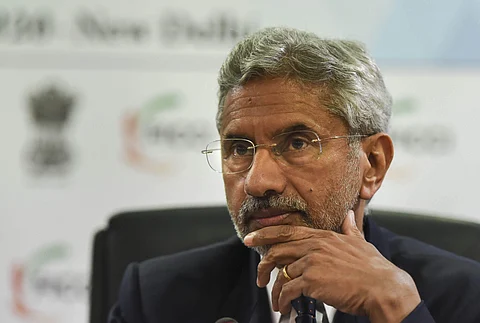

The ongoing protests at the South Asian University, New Delhi, found mention in the Parliament this week, with MPs Binoy Viswam and Syed Nasser Hussain seeking a response from the Minister of External Affairs, S Jaishanker on the matter. In his response, the minister remarked that since SAU is an international university, it is not "the policy of the government of India to interfere in the workings of an international university.
Moreover, Jaishankar hinted that the university, which is sponsored by eight nations of the South Asian Association for Regional Cooperation (SAARC), is facing financial constraints. "Some of the countries have not made the payments that they were required to make. so the university is going through a period of very severe financial stress. Beyond that, there are issues of management and academic freedom," said Jaishanker. The Minister also added that the government of India is open to providing "influence or counsel" to help sort out issues at the varsity in an "amicable and non-stressful" manner.
Letters have also been written to the Ministry of External Affairs by several MPs, including Kunwar Danish Ali, Haji Fazlur Rehman, Dr Syed Naseer Hussain, Rajya Sabha MP Binoy Viswam, Sandosh Kumar P and Dr Raja the General Secretary of the Communist Party of India. Now, MP Dr D Ravikumar has also penned a letter to the Minister, S Jaishanker, highlighting the expulsion of a PhD student from Tamil Nadu, Bhimraj M, and the condition of a master's student, Ammar Ahmed who was hospitalised in November after he suffered seizures and a heart attack, as a result of being suspended from the university for participating in the protests. The university had also expelled another PhD student, Umesh Joshi along with Bhimraj for their protest at the Registrar's office, demanding that Ammar's suspension, which was later reduced to rustication, be revoked entirely.
The letter requested an intervention from the Minister to revoke the "arbitrary expulsion orders" and to ensure the "well-being" of the hospitalised student. The MP from Viluppuram, Tamil Nadu also pointed out that the expulsion without due process of Bhimraj, a Dalit student from Tamil Nadu, amounted to institutional harassment and was a "grave injustice." "This cannot be divorced from the fact that university spaces in India are increasingly becoming hostile for students belonging to marginalised communities," wrote the MP.
Ammar Ahmed, who has been hospitalised since November 23 is still in the ICU, and not yet fully conscious, sources told Edexlive, adding that he is "unable to sit, walk, eat, lift his hands, or talk." Students have now started a crowdfunding campaign to pay for Ammar's medical expenditure. However, they claim that the university, which had earlier declared that it would cover the medical expenses, has now "backtracked on its decision." In a written letter to the hospital, and an email to the student body, the administration had said on November 24 and November 28, respectively, that it will cover the bills, above the insurance admissible amount of 1,50,000. Edexlive has reached out to the university for a comment on the matter, and this report will be updated accordingly.
Students at SAU have been protesting for an increase in stipend for Master's students to Rs 7,000 and parity for international students with the Junior Research Fellowship (JRF) since last month. They have also been demanding active representation in the Internal Complaints Committee of the varsity. The students embarked on an indefinite hunger strike on November 7, and although there are no students currently on hunger strike, some still occupy the administrative block in protest, as a result of which the Acting President and the Acting Vice President are working in different rooms, sources told Edexlive. The strike resulted in Proctorial orders expelling two students, rusticating two students for a year and suspending a student from Bangladesh for one semester. The varsity then mitigated these punishments after Ammar was hospitalised.
